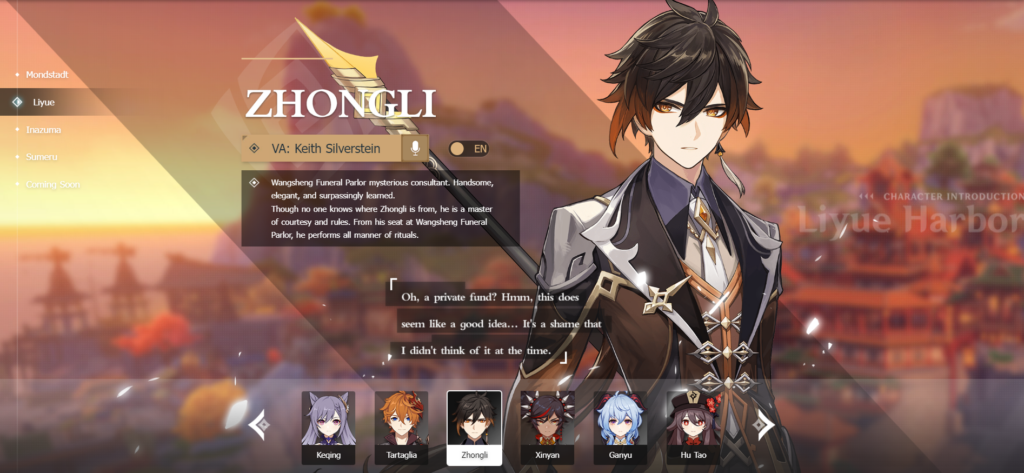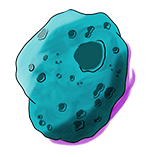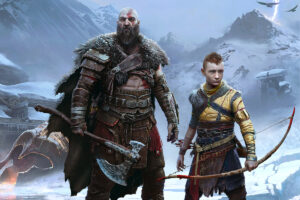Like many American-born members of the Chinese diaspora, English eclipsed my immigrant tongue at a young age. While I can carry out a conversation in Cantonese well enough, I do end up falling back into “Chinglish” and mixing the two languages together to get through more complicated and specialized vocabulary.
So as a halfway decent Cantonese speaker playing Genshin Impact with Mandarin audio, I get maybe 30% of the dialogue on my own and rely on subtitles for the rest. This, however, doesn’t always accurately convey what was spoken, as it’s incredibly difficult to translate some of the more archaic phrases and manners of speech in the game. Without the equivalent context in a different culture, text cannot be translated literally, which will inevitably and unfortunately result in a loss of the original intent and meaning during the process.
The Need for Transcreation
One of the more beautiful and complicated features of the game is its employment of 成語 chéngyǔ. Chengyu is a type of idiomatic speech often found in classical literature and commonly consists of four characters. It is still used in today’s common vernacular, with nearly 20,000 different chengyu in existence. Chengyu often (but not always) takes the “big idea” of a story or historical event, condenses it down to the most important parts, and conveys the intention and morals behind the situation or story. An entire story or event in four words! You can imagine that it’d take some effort to arrive at the lesson. Additionally, if you try to translate these four characters literally, following the linguistic rules of modern Chinese, you will result in something incoherent. This is why transcreation is needed.
All of Zhongli’s combat lines are crafted using the style of chengyu, and due to chengyu’s idiomatic nature, translating these lines and having them fit within the chaotic tempo of a fight is nearly impossible (which is probably why we get some one-word English lines to convey these things). Regrettably, this also means that certain deeper meanings don’t make it to the Western audience.

As an example, this skill combat line is an existing chengyu: “壁立千仞 bìlì qiān rèn”—interpreted in the English version as “Rise.” 壁立千仞 bìlì qiān rèn is the first part of a couplet written by Lin Zexu, a philosopher and politician from the Qing Dynasty:
海納百川,有容乃大;
hǎi nà bǎichuān, yǒu róng nǎi dà
壁立千仞,無欲則剛
bìlì qiān rèn, wú yù zé gāng
Let’s Break This Down!
海納百川 (hǎi nà bǎichuān) – The sea can accommodate thousands of rivers
有容乃大 (yǒu róng nǎi dà) – Its vastness is due to how it accepts every river indiscriminately
壁立千仞 (bìlì qiān rèn) – The cliffs can stand upright
無欲則剛 (wú yù zé gāng) – because it has no excessive desires
With this reference, Zhongli is declaring that, because he is a person without selfish desires, he is able to be strictly just and impartial, and his will is unyielding and unwavering. You can also see why it can’t quite be used in the English translation for a combat line. “The cliffs stand upright”—or more literally, “the rock wall stands 1,000 rèn (about 8,000 feet) tall”—would not have enough context for non-Chinese audiences to understand.

As a testament to the ever-evolving life and fluidity of language, HoYoverse created their own “chengyu” with Zhongli’s very famous elemental burst line, “I will have order.” In Chinese, this line is “天動萬象” tiān dòng wànxiàng. Breaking this down: 天動 tiān dòng means “the heavens move” and 萬象 wànxiàng means “every manifestation of nature.” As a whole, this means “the world moves around heaven’s order.” “天 tiān” can be translated as “sky,” “day,” “heaven,” or “god/celestial.” The word can be used to refer to the governing deity or a supreme celestial god. In the context of the game, the governing deity in Liyue would have been Zhongli himself. Liyue citizens revered and loved him for his justice and mercy, and culturally, he would’ve been seen as their tian—speaking to various people around the country, it’s evident many see him as their tian even more so than they see Celestia in this light. Additionally, even before becoming archon, Zhongli was one of the most powerful beings in Teyvat. So in this context, with “heaven” being Zhongli, an obvious interpretation of the chengyu is “I will shape the world in my order.”
Amazing what four little words can do, isn’t it?
The Takeaway
The employment of chengyu in this game adds depth and richness, and can even allow the game to serve as a teaching medium. As a non-native Mandarin speaker and an American-born Chinese (ABC) who is missing much of the context of this language, excitement mixes with grief when learning about these secondhand through research and more knowledgeable primary sources. Linguistically, I can’t experience the beauty of this in real-time, needing instead to learn about it after the fact.
But this is why the game is so important to me.
It’s a way for my diaspora identity to reconnect with a part of me that didn’t have the opportunity to grow and develop. The folklore that the game draws inspiration from in order to craft new characters, quests, and stories becomes accessible since I’m given a starting point. Then it’s a wandering trail through new discoveries and learnings.



